Pour l’installation de OSMC voir : https://www.cyber-neurones.org/2016/09/installation-un-media-center-avec-osmc-sur-un-raspberry-pi-3-model-b/ . « Installation un media-center avec OSMC sur un Raspberry Pi 3 Model B » ( fait le .
Note : Le disque SSD 120 Go chez Amazon :
Je fais ce tutoriel suite à la corruption d’une carte SD sur mon raspberry.
Lire les articles :
- http://www.magdiblog.fr/divers/comment-prolonger-la-duree-de-vie-de-vos-cartes-sd-sur-raspberry-pi/ : Comment prolonger la durée de vie de vos cartes SD sur Raspberry Pi (màj)
- https://easydomoticz.com/forum/viewtopic.php?t=5867 : Longevité carte SD – Taux d’écriture et config sur RPi
- http://hardware-libre.fr/2014/03/raspberry-pi-et-corruption-de-carte-sd/ : Raspberry Pi et corruption de carte SD .
- https://www.raspberrypi.org/forums/viewtopic.php?t=199414 : microSD vs. USB flash vs. SSD
Première étape : Connexion SSH sur OSMC, il suffit de regarder dans les paramètres pour trouver l’IP : .
Ensuite on fait un ssh sur l’IP avec le login osmc et le mot de passe osmc :
$ ssh osmc@192.168.0.28 osmc@192.168.0.28's password: The programs included with the Debian GNU/Linux system are free software; the exact distribution terms for each program are described in the individual files in /usr/share/doc/*/copyright. Debian GNU/Linux comes with ABSOLUTELY NO WARRANTY, to the extent permitted by applicable law. Updating APT cache. Please be patient. Generating locales (this might take a while)... fr_FR.UTF-8... done Generation complete. osmc@osmc:~$
On commence par une mise à jours :
osmc@osmc:~$ sudo apt-get update osmc@osmc:~$ df -h Sys. de fichiers Taille Utilisé Dispo Uti% Monté sur devtmpfs 362M 0 362M 0% /dev tmpfs 367M 19M 348M 6% /run /dev/mmcblk0p2 29G 2,1G 26G 8% / tmpfs 367M 0 367M 0% /dev/shm tmpfs 5,0M 0 5,0M 0% /run/lock tmpfs 367M 0 367M 0% /sys/fs/cgroup /dev/mmcblk0p1 240M 22M 219M 9% /boot tmpfs 74M 0 74M 0% /run/user/1000 root@osmc:~# lsblk NAME MAJ:MIN RM SIZE RO TYPE MOUNTPOINT sda 8:0 0 111,8G 0 disk mmcblk0 179:0 0 29,7G 0 disk ├─mmcblk0p1 179:1 0 243M 0 part /boot └─mmcblk0p2 179:2 0 29,5G 0 part / root@osmc:~# sudo apt install rsync .... root@osmc:~# sudo fdisk /dev/sda Welcome to fdisk (util-linux 2.25.2). Changes will remain in memory only, until you decide to write them. Be careful before using the write command. Device does not contain a recognized partition table. Created a new DOS disklabel with disk identifier 0x64f9ca91. Command (m for help): p Disk /dev/sda: 111,8 GiB, 120034123776 bytes, 234441648 sectors Units: sectors of 1 * 512 = 512 bytes Sector size (logical/physical): 512 bytes / 512 bytes I/O size (minimum/optimal): 512 bytes / 512 bytes Disklabel type: dos Disk identifier: 0x64f9ca91 Command (m for help): d No partition is defined yet! Could not delete partition 1995033425 Command (m for help): w The partition table has been altered. Calling ioctl() to re-read partition table. Syncing disks. root@osmc:~# sudo fdisk /dev/sda Welcome to fdisk (util-linux 2.25.2). Changes will remain in memory only, until you decide to write them. Be careful before using the write command. Device does not contain a recognized partition table. Created a new DOS disklabel with disk identifier 0x7ac27f0a. Command (m for help): n Partition type p primary (0 primary, 0 extended, 4 free) e extended (container for logical partitions) Select (default p): p Partition number (1-4, default 1): 1 First sector (2048-234441647, default 2048): Last sector, +sectors or +size{K,M,G,T,P} (2048-234441647, default 234441647): Created a new partition 1 of type 'Linux' and of size 111,8 GiB. Command (m for help): w The partition table has been altered. Calling ioctl() to re-read partition table. Syncing disks. root@osmc:~# sudo mke2fs -t ext4 -L rootfs /dev/sda1 mke2fs 1.42.12 (29-Aug-2014) En train de créer un système de fichiers avec 29304950 4k blocs et 7331840 i-noeuds. UUID de système de fichiers=c8478b72-fcaf-4dc7-87a7-5156cc19efab Superblocs de secours stockés sur les blocs : 32768, 98304, 163840, 229376, 294912, 819200, 884736, 1605632, 2654208, 4096000, 7962624, 11239424, 20480000, 23887872 Allocation des tables de groupe : complété Écriture des tables d'i-noeuds : complété Création du journal (32768 blocs) : complété Écriture des superblocs et de l'information de comptabilité du système de fichiers : complété root@osmc:~# sudo mount /dev/sda1 /mnt --> Arrêt de tous les services, pour avoir la liste : root@osmc:~# service --status-all root@osmc:~# sudo rsync -avx / /mnt sending incremental file list ... --> 6 heures de copie ! ... sent 1,258,978,550 bytes received 742,144 bytes 91,619.38 bytes/sec total size is 2,002,639,532 speedup is 1.59 ... .. osmc@osmc:~$ df -h Sys. de fichiers Taille Utilisé Dispo Uti% Monté sur devtmpfs 362M 0 362M 0% /dev tmpfs 367M 38M 330M 11% /run /dev/mmcblk0p2 29G 2,2G 26G 8% / tmpfs 367M 0 367M 0% /dev/shm tmpfs 5,0M 0 5,0M 0% /run/lock tmpfs 367M 0 367M 0% /sys/fs/cgroup /dev/mmcblk0p1 240M 22M 219M 9% /boot /dev/sda1 110G 2,2G 103G 3% /mnt tmpfs 74M 0 74M 0% /run/user/1000 osmc@osmc:~$ sudo cp /boot/cmdline.txt /boot/cmdline.txt.orig osmc@osmc:~$ cat /boot/cmdline.txt root=/dev/mmcblk0p2 rootfstype=ext4 rootwait quiet osmcdev=rbp2 osmc@osmc:~$ sudo vi /boot/cmdline.txt osmc@osmc:~$ cat /boot/cmdline.txt root=/dev/sda1 rootfstype=ext4 rootwait quiet osmcdev=rbp2 osmc@osmc:~$ cat /mnt/etc/fstab /dev/mmcblk0p1 /boot vfat defaults,noatime 0 0 /dev/sda1 / ext4 defaults,noatime 0 0 /dev/mmcblk0p2 /old ext4 defaults,noatime 0 0
Quelques statistiques sur le disque SSD & la SD Card (avant le reboot):
root@osmc:~# sudo apt-get install sysstat
osmc@osmc:~$ iostat -k
Linux 4.4.16-4-osmc (osmc) 20/09/2018 _armv7l_ (4 CPU)
avg-cpu: %user %nice %system %iowait %steal %idle
4,73 2,27 0,97 25,61 0,00 66,42
Device: tps kB_read/s kB_wrtn/s kB_read kB_wrtn
mmcblk0 10,11 546,62 64,26 50417993 5927146
sda 0,36 0,27 31,21 24977 2879036
osmc@osmc:~$ iostat -m
Linux 4.4.16-4-osmc (osmc) 20/09/2018 _armv7l_ (4 CPU)
avg-cpu: %user %nice %system %iowait %steal %idle
4,74 2,26 0,97 25,60 0,00 66,42
Device: tps MB_read/s MB_wrtn/s MB_read MB_wrtn
mmcblk0 10,10 0,53 0,06 49236 5788
sda 0,36 0,00 0,03 24 2815
Après le reboot :
osmc@osmc:~$ df -h Sys. de fichiers Taille Utilisé Dispo Uti% Monté sur devtmpfs 362M 0 362M 0% /dev tmpfs 367M 5,0M 362M 2% /run /dev/sda1 110G 2,2G 103G 3% / tmpfs 367M 0 367M 0% /dev/shm tmpfs 5,0M 0 5,0M 0% /run/lock tmpfs 367M 0 367M 0% /sys/fs/cgroup /dev/mmcblk0p1 240M 22M 219M 9% /boot /dev/mmcblk0p2 29G 2,2G 26G 8% /old tmpfs 74M 0 74M 0% /run/user/1000 osmc@osmc:~$ lsblk NAME MAJ:MIN RM SIZE RO TYPE MOUNTPOINT sda 8:0 0 111,8G 0 disk └─sda1 8:1 0 111,8G 0 part / mmcblk0 179:0 0 29,7G 0 disk ├─mmcblk0p1 179:1 0 243M 0 part /boot └─mmcblk0p2 179:2 0 29,5G 0 part /old
Voici l’activité de la carte SD et du disque SSD :
Le disque SSD est très lent via l’USB. Misère.

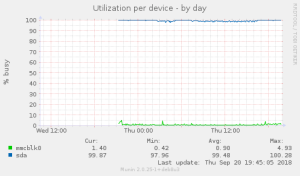
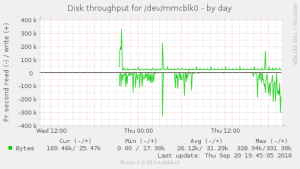
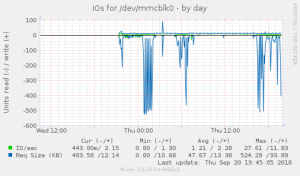
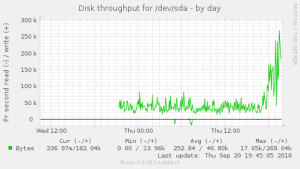
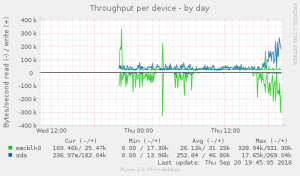
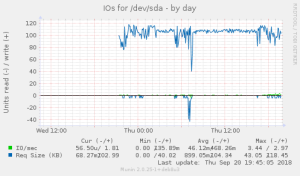

bonjour,
j’ai installé aussi un A400 sur un raspberry 3 B+, mais j’ai un pb d’alim. Lorsque je branche l’alim du raspberry, le serveur boote mais lorsque je fais un sudo reboot, il ne veut plus booter. La led pwr reste désespéramment rouge.
Aurais tu eu aussi ce soucis?
J’ai utilsé un Hub USB mais le problème est pire puisque il faut que le ssd soit branché directement sur l’USB du raspberry.
Merci,
david
Bonjour,
Et sur l’écran tu n’as rien ?
Frédéric.
bonjour,
le raspi a assez de ressource pour alimenter le ssd ou faut il prévoir une alim externe ?
Oui sans problème.